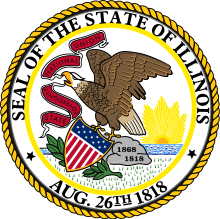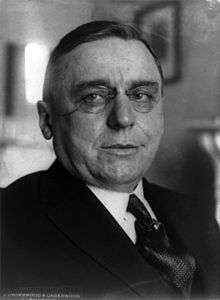1931 Chicago mayoral election
The 1931 Chicago mayoral election was held to elect the Mayor of Chicago. Former Cook County Board of Commissioners President Anton Cermak defeated incumbent mayor William Hale Thompson (who remains to date the last Republican mayor of Chicago) by a 17-point margin of victory.[1][2]
| Turnout | 82% | ||||||||||||||||
|---|---|---|---|---|---|---|---|---|---|---|---|---|---|---|---|---|---|
| |||||||||||||||||
 Results by ward | |||||||||||||||||
| |||||||||||||||||
| Elections in Illinois | ||||||||||
|---|---|---|---|---|---|---|---|---|---|---|
 | ||||||||||
|
||||||||||
|
||||||||||
|
||||||||||
Nominations
Primaries were held on Feb 24, 1931.[3]
Democratic primary
Anton Cermak won the Democratic nomination. Cermak was the incumbent President of the Cook County Board of Commissioners, having served in that position since 1923.
Republican primary
Incumbent mayor William Hale Thompson warded off challenges from judge John Homer Lyle and 43rd Ward alderman Arthur F. Albert.
John Homer Lyle was characterized by Time magazine as a. " publicity-crazed Municipal Judge"[4]
Ugly name-calling took place between Thompson and Lyle.[4] Thompson derided Lyle as a, "nutty judge".[4] Lyle called Thompson "William Halitosis Thompson" and characterized him as having the "flabby jowls of a barnyard hog, two jackass ears, a cowboy hat and an empty space between."[4] Other insults slung around between the two included dirty rat, hoodlum, lazy bloodsucking jobber, blustering loudmouth, irresponsible mountebank, blubbering jungle hippopotamus, shambling imbecile, skunk, and a "chambermaid in a ranch bunkhouse".[4]
| Party | Candidate | Votes | % | |
|---|---|---|---|---|
| Republican | William Hale Thompson (incumbent) | 296,204 | 47.52 | |
| Republican | John Homer Lyle | 227,986 | 36.58 | |
| Republican | Arthur F. Albert | 99,137 | 15.90 | |
| Total votes | 623,327 | 100.00 | ||
Independents
General election
Campaign
With the Century of Progress approaching, Chicago would be electing a mayor that (barring extraordinary circumstances) was going to represent the city in front of an international audience.
The campaign got ugly pretty fast.[6]
During the campaign Thompson made many appeals to nativism. One such example was his appeal to antisemitism by villainization of Jewish businessman Julius Rosenwald. In one speech delivered in March he said of Rosenwald, "Well, we got a great philanthropist in this town, and he's a Jew, and he's trying to edge his way out of hell by giving part of the money he steals."[7][8]
Since Cermak was an immigrant from Bohemia, Thompson lodged ethnic attacks
- I won't take a back seat to that Bohunk, Chairmock, Chermack or whatever his name is.
- Tony, Tony, where's your pushcart at?
- Can you picture a World's Fair mayor with a name like that?[9][10]
Cermak was able to respond effectively to these attacks, "He doesn't like my name...It's true I didn't come over on the Mayflower, but I came over as soon as I could," which was a sentiment to which ethnic Chicagoans could relate, so Thompson's slurs largely backfired.[10][6][9]
In the midst of the campaign, the Chicago Tribune ran articles outlining Al Capone's financial contributions to Republican politicians.[11] The newspapers also covered allegations that Samuel Insull had contributed money to Thompson's campaign.[11] The Tribune wrote, "When the traction case was settled during Thompson's third term Insull was given a perpetual franchise that could not be terminated even for misuse non use or mal use".[11]
Gossip of Thompson's ties to Al Capone gained new strength after one of Thompson's top city officials, also a friend of Capone, was indicted for conspiring with merchants to use short weights to cheat $54 million.[6]
Thompson accused Cermak of being in cahoots with bootleggers and gamblers, and accused Cermak of having profited from misconduct alleging that he had, "saved six million out of a $10,000 salary."[6]
The election took place amid the Great Depression.[10] The Depression, taking place under the administration of Republican president Herbert Hoover, may have ultimately contributed to Thompson's defeat.[10]
For the election, Cermak had managed to overhaul his public image. Long viewed as a political infighter, Cermak rebranded himself as a "master executive" who would be able to help the city of Chicago survive the Great Depression.[12]
Results
Voter turnout was remarkably high, with 82% of registered voters participating.[10]
Cermak carried 45 wards, while Thompson carried five.[6] The five wards that Thompson carried all had sizable black populations.[6]
| Party | Candidate | Votes | % | |
|---|---|---|---|---|
| Democratic | Anton Cermak | 671,189 | 58.44 | |
| Republican | William Hale Thompson (incumbent) | 476,922 | 41.53 | |
| Unknown | John M. Collins | 219 | 0.02 | |
| Unknown | Otto H. Wangerin | 124 | 0.01 | |
| Unknown | Herman N. Bundeson | 4 | 0.00 | |
| Unknown | Charles Cutteng | 1 | 0.00 | |
| Unknown | Dallas Killiam | 1 | 0.00 | |
| Unknown | R.J. Williamson | 1 | 0.00 | |
| Unknown | Carter Harrison | 1 | 0.00 | |
| Unknown | Louis J. Orr | 1 | 0.00 | |
| Unknown | Winfield O. Williams | 1 | 0.00 | |
| Unknown | Judge Lagle | 1 | 0.00 | |
| Turnout | 1,148,465 | 100.00 | ||
Thompson carried only five of the city's fifty wards.[13]
Cermak received 76.80% of the Polish-American vote, while Thompson received 23.20%.[14]
References
- . Board of Elections Commissioners. 1931. Missing or empty
|title=(help) - "Chicago Mayors, 1837-2007". Encyclopedia of Chiacgo. Chicago Historical Society. Retrieved 22 September 2018.
- https://www.ourcampaigns.com/RaceDetail.html?RaceID=283328 RaceID=283328 (Our Campaigns)
- National Affairs: Chicago Circus (Time Magazine) Feb. 23, 1931
- Names of Candidates. Board of Elections Commissioners. 1931.
- Cohen, Adam; Taylor, Elizabeth (2001). American Pharaoh: Mayor Richard J. Daley - His Battle for Chicago and the Nation. Little, Brown. pp. 37–38. ISBN 978-0-7595-2427-9. Retrieved 26 May 2020.
- Bukowski, Douglas (1998). Big Bill Thompson, Chicago, and the Politics of Image. University of Illinois Press.
- Mackerels in the Moonlight: Four Corrupt American Mayors By Gerald Leinwand (page 63)
- Wendt, Lloyd (1979). Chicago Tribune: The Rise of a Great American Newspaper. Chicago: Rand McNally. ISBN 0-528-81826-0.
- Simpson, Dick (8 March 2018). "Rogues, Rebels, And Rubber Stamps: The Politics Of The Chicago City Council, 1863 To The Present". Routledge. Retrieved 19 May 2020.
- Schottenhamel, George. “How Big Bill Thompson Won Control of Chicago.” Journal of the Illinois State Historical Society, vol. 45, no. 1, 1952, pp. 30–49. JSTOR
- Green, Paul M.; Holli, Melvin G. (10 January 2013). "The Mayors: The Chicago Political Tradition, fourth edition". SIU Press. p. 223. Retrieved 22 May 2020.
- Selzer, Adam (13 February 2015). "Rahm might be bad, but Chicago's last Republican mayor was worse". TimeOut. Retrieved 23 March 2019.
- Kantowicz, Edward. “The Emergence of the Polish-Democratic Vote in Chicago.” Polish American Studies, vol. 29, no. 1/2, 1972, pp. 67–80. JSTOR, JSTOR

.tiff.jpg)